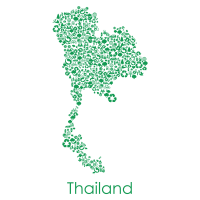2. Strategy for green development
Circular -Green (BCG) model is a key mechanism to promote more sustainable production and consumption activities in Thailand. It leverages the country’s strengths in biodiversity and cultural richness, and employs technology and innovation to transform Thailand into a value-based and innovation-driven economy.
The model was inspired by the Sufficiency Economy Philosophy (SEP), a key pillar of Thailand’s social and economic development, aligned with the United Nations Sustainable Development Goals (SDGs). The BCG model is implemented through 4 high-level strategies and 13 measures, and with close collaboration between key government agencies, industries, academia and communities. It aims to promote the sustainability of bioresources, strengthen communities and the grassroots economy, improve the sustainable competitiveness of Thailand’s industries, and build resilience to global change. The BCG model focuses on four high-priority sectors: (i) food and agriculture; (ii) bioenergy and biomaterials; (iii) medicine and wellness; and (iv) tourism and creative economy. Specific areas of interest include the transition to a low-carbon economy and clean technologies. The development model should create sustainability and inclusion for the economy, society and environment.
There are also several other government policies in the areas of green economy and inclusive growth in Thailand, including the National Strategy 2018-2037, the Climate Change Master Plan 2015-2050, the Long-Term Greenhouse Gas Emissions Development Strategy, the Second National Action Plan on Waste Management 2022-2027, and the draft National Energy Plan.
The private sector in Thailand has been active in raising funds for activities that promote biodiversity and sustainable ecosystems. In 2018, TMB Bank issued a 7-year Green Bond worth 1.85 billion Thai baht (about US$54 million) to finance climate-smart projects and activities. The Bank for Agriculture and Agricultural Cooperatives (BAAC) is also issuing Green Bonds worth 20 billion baht (about US$584 million) to finance privately-run afforestation projects that generate income for local communities. BAAC’s project is expected to increase forest area by 800 square kilometers.
In 2019, Thailand joined the United Nations Partnership for Action on Green Economy (PAGE), in November 2022, PAGE Thailand officially launched the implementation phase of PAGE’s work plan on green economic transformation in Thailand. The launch marked an important step in accelerating partnerships and investments towards green economy and green recovery policies in Thailand. PAGE Thailand aims to implement inclusive green economy in five key areas: 1) reducing carbon emissions and pollution; 2) promoting energy and resource efficiency; 3) conserving biodiversity and ecosystems; 4) creating decent jobs; and 5) a just transition towards equality and prosperity for all. These action areas aim to overcome the challenges of poverty, social inequality and environmental degradation while generating sustainable economic growth in line with environmentally friendly and socially just principles.
